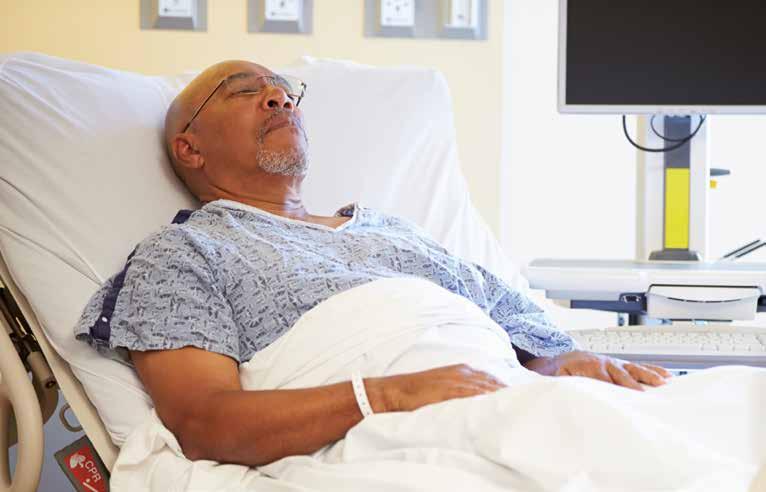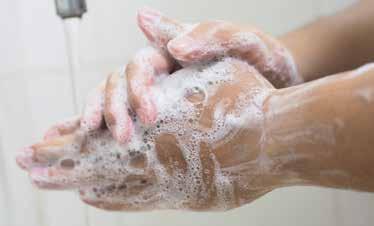
11 minute read
Nottingham University Hospitals NHS Trust – The right place for your care
The right place for your care
Acute Hospitals, such as the Queens Medical Centre and City Hospitals, are for people who require emergency, medical or surgical treatment within a hospital environment.
Advertisement
We aim for you to only be in hospital for as long as necessary. We will do our best to ensure that as soon as this need is over, you leave hospital safely. When your treatment has been completed it is important that your stay is not delayed for the following reasons: • some people find it harder to return home the longer they stay in hospital • there is a risk of acquiring infections in hospital, so leaving at the earliest opportunity means this is less likely • By helping you home when the ward team agree you are well enough to leave hospital, you get the best possible chance for recovery and recuperation. This reduces your risk of falls & muscle wastage. When patients stay in hospital longer than needed, it makes it more difficult for us to admit those who require emergency care or urgent operations.
Your stay in hospital
What to bring
We encourage our patients to get dressed and mobile as soon as they are able to promote their dignity and to help them recover quicker. We would love to see more patients in their own clothes as it helps them feel more positive and has a beneficial effect on well-being. Getting patients moving, if they are able to, often reduces the length of time they need to spend in hospital, aids recovery and reduces de-conditioning through muscle wasting. To help this we ask you to also bring: • daywear, underwear, socks and comfortable shoes • a separate set of outdoor clothes, including coat and foot wear, for you to wear when you are discharged. We encourage family and friends to help you with eating, dressing and walking (where appropriate) and our staff are happy to support you in the correct way to do this. Together we can help encourage our patients to get moving to get home.
Please do not bring large amounts of money or valuables with you.
It is easier to bring these things in when you have a planned visit to hospital, less easy when you arrive with us in an emergency. However, this is a useful list to give to your family so that they may bring these items to you for use during your stay.
Your hospital team
In hospital you will find a multi-disciplinary team which may include doctors, matron, ward nurses, occupational therapists, physiotherapists, pharmacists, dietitians and social workers who could all be involved in your care. The relevant professional will talk with you and assess what you are able to do and what you might need more help with. They will then discuss with you what treatment, help or support is available to improve your independence. The therapists will discuss with other members of the hospital team their findings and together with you and your family/ carer make a plan for your discharge from hospital.
Carers
Carers are people who care, in an unpaid capacity, for friends or family members who are ill, frail or disabled and can come from all backgrounds and cultures and can be of any age or gender. We are dedicated to supporting carers. Please speak to the ward manager (senior nurse) about how we can support you in your role as a carer.
Our flexible visiting arrangements
Whilst we manage the Covid-19 virus visiting at the QMC and Nottingham City Hospital has changed – visit our website for the latest information. We are currently not allowing visitors unless outside of some special allowances.There special allowances are for birthing partners, parents of patients under 18, those supporting someone with a mental health issue such as dementia, a learning disability or autism, where not being present would cause the patient to be distressed, relatives collecting patients on discharge and those at the end of life. These will be restricted and visitors must be prearranged with the nurse in charge.
Top tips for sleeping well in hospital
Everything about our physical and mental health is better when we sleep well. Here are a few tips that we hope you will find helpful: • Move about as much as you can during the day as this will help you to sleep better • Talk to staff about your usual getting ready for bed routine and bedtime, they will try to help you follow your usual pattern • Discuss with the nurse looking after you when and why they might need to wake you during the night • If you have a comforting item that helps you to sleep at home, ask staff whether you can bring it in • Use earplugs and an eye mask to reduce noise and light. Please ask your nurse for some if you would find them helpful • If you have a mobile phone and earphones try using a relaxation, mindfulness or sleep app • Avoid looking at phone screens for an hour before sleep. Their blue light reduces natural sleepiness and keeps us awake

• Sleep is hard to come by if you are hungry. Various snacks are available on the ward. Please don’t hesitate to ask for something to eat • Decaffeinated drinks are available to help you avoid caffeine. Caffeine keeps some people awake. Staff can also make you a drink using your own herbal or fruit teabags • Let a nurse know if you are hot, cold, worried, uncomfortable or in pain at any point during the night • Ask staff to adjust lighting or reduce noise – they really do want you to sleep well We are sure you will understand that it might be necessary for staff to monitor you and to give you medicines or other care during the night. They will only wake you if it is absolutely necessary. Sometimes patients near you will also have to receive care or be moved during the night. Other patients might need to be brought to the ward. Staff will try to do everything as quietly as possible.

Helping prevent the spread of infections
The risk of getting an infection in hospital is very low. With the Covid-19 virus we have put in extra measures across our hospitals to keep you and our staff safe. This includes the wearing of face masks, social distancing, and in some areas screens have been put up and furniture removed to help people socially distance. Now, more than ever it is important to do your bit to help cut the spread of infections by following a few simple rules: • Keep your hands and body clean when you are in hospital, ensure that you bring your own toiletries and razor • Wash your hands with soap and warm water and alcohol gel before you eat a meal • Make sure you always wash your hands with soap and warm water after using the toilet • If you use a commode ask for a bowl of warm water and soap to wash your hands afterwards • If you visit the bathroom or toilet and it does not look clean, report this immediately to the nurse in charge of the ward. Request it is cleaned before you use it, and use an alternative (if available) in the meantime • Try to keep the top of your locker and bedside table free from clutter. Too many things left on top make it difficult for staff to clean properly • Your bed-area should be cleaned regularly. If you or your visitors see something that has been missed during cleaning, report it to the nurse in charge and ask for it to be cleaned • Always wear something on your feet when walking around in hospital. A comfortable pair of slippers is fine, but make sure they have some grip on the bottom, as hospital floors can be a little slippery sometimes.
Chaplaincy
Many people find that the stress of coming into hospital raises all sorts of questions, anxieties and fears. Everyone has spiritual needs and these can often go unrecognised until times of crisis. Our Chaplaincy Team is here to listen in confidence and offer emotional support to our patients and their families and carers, whatever their faith, tradition or outlook. The team includes Christian, Hindu, Muslim and Sikh chaplains as well as a non-religious Pastoral Carer. Our chaplains are supported by volunteers from various faiths and beliefs.
The team visit the wards regularly, so if you would like a visit, please speak to a member of staff who will help organise it for you.
When you are ready to go home
It is important to know that the majority of patients will be transferred home directly from hospital. You will need to arrange your own transport in advance to take you home. Transport can only be arranged in special circumstances and if you meet the eligibility criteria.
Whilst NHS care is free to everyone, social care is not. Some people will be able to return home to live a completely independent life whilst others may need some extra short term support.
Once you have received information about the discharge choices that are available to you, we request that you make a decision as soon as possible (ideally within 24 hours, but no longer than 7 days from being declared medically safe for discharge). You may wish to arrange for yourself or a family member to meet with the care providers during this time. Where appropriate, you will receive a letter to confirm your discharge plan and the choice you are being asked to make.
If your preferred choice is not available when you are ready for discharge, an alternative option may be arranged for you temporarily. It is not possible for you to stay in hospital once you no longer require our acute care. You will receive a letter to confirm the proposed alternative care arrangements.
We also recommend that if you are a day patient and having any form of sedation that you arrange for someone to take you home.
Whilst you are waiting for your relatives or transport to take you home you will wait in one of our Discharge Lounges unless otherwise indicated. Our staff will provide you with refreshments whilst you are waiting and a nurse is available to help with your medical needs and give further advice about leaving hospital.
After you leave us
• We will inform your GP of any changes to your medication.
• You will need to contact your GP surgery, or the pharmacy you use, for more of your medication so that you do not run out. Always re-order early as prescriptions usually take two days to be issued.
• If you have any problems after you have been discharged contact your GP surgery or call 111.
Please do not hesitate to ask questions about your discharge at any time during your stay.
Here to help
If you, your family or carer has any questions or concerns or wish to understand more about what is happening at any stage during your stay, please speak to your nurse, doctor or other member of staff involved in your care.
If those staff cannot help you or you are not comfortable speaking to them you can contact our Patient Advice and Liaison Service (PALS). PALS is available to help and will liaise with hospital staff, internal departments and other relevant organisations to resolve any concerns or any problems you may have as quickly as possible. PALS offer confidential advice, support and information and can also signpost you to other services. If PALS cannot resolve a problem, they will advise you on how to make a complaint.
Please note that PALS cannot offer medical advice or influence waiting lists.

Tell us what you think
Your experience matters and we want to hear what you think about our services, good or bad. We consider all feedback as an opportunity to learn and will use your comments and suggestions to improve our services and to also celebrate the things we do well. There are a number of different ways you can give us your feedback.
NHS Friends and Family Test - fill out the survey on a device, card or comment through our website
Care Opinion – Care Opinion is a place where you can share your experience of health or care services. To share your story log on to: www.careopinion.org.uk
NHS website – You can leave feedback and share your experience of our services on the NHS website
Healthwatch – Healthwatch is an independent voice for the people of Nottingham and Nottinghamshire. To leave comments telephone 0115 956 5313 or log on to: https://hwnn.co.uk
Tweet us @nottmhospitals or leave a message on the Trust’s Facebook page https://www.facebook.com/nottinghamhospitals
Overseas patients’ charges
From the 23 October 2017 a legal requirement on NHS staff was put into place to make sure that the patients they are treating are eligible for free NHS treatment/ care.
We should not be treating any known overseas visitors without securing payment for their treatment in advance unless doing so would prevent or delay the provision of immediately necessary or clinically urgent care. This is in line with current national policy.
We have an Overseas Visitor Team who help and support frontline staff should they believe any patient could potentially be an overseas visitor and need to pay for their treatment.







